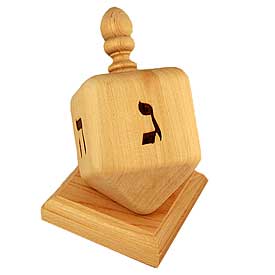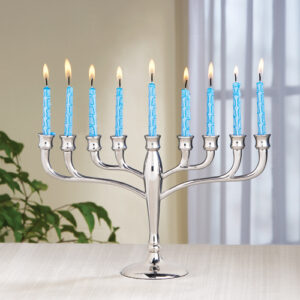The word Chanukah is the Hebrew word for “dedication.” The title in English is the “Feast of Dedication.” The word refers to the rededication of the Temple, in Jerusalem, after its desecration by the Greeks in 164 B.C. The Book of Daniel predicts the desecration of the Temple in chapters 8 and 11.
Alexander the Great acquired control of the Land of Israel in 332 B.C. Upon his death his empire was divided up among his four generals. Two of these generals founded dynasties – the Ptolemies in Egypt and the Seleucids in Syria. In 198 B.C. the Seleucids took over control of Israel. Early Seleucid rule was tolerant of Jewish culture and Jewish faith.
But, in 175 B.C. Antiochus IV Epiphanes came to the throne. He desired to infuse everything with Greek culture and Greek religion. As a result, he attempted to eradicate the Jewish faith. He prohibited Jewish spiritual practices. He attempted to destroy all copies of the Bible, and he required everyone to worship the Greek god Zeus. His crowning outrage was to erect a statue of Zeus and sacrifice a pig in the Jerusalem Temple itself.
Opposition to Antiochus was led by Mattathias and his five sons. Mattathias destroyed a Greek altar established in his village of Modin and killed a representative of King Antiochus. Mattathias and his sons then fled to the Judean hills and formed a guerrilla army. This triggered the Maccabean revolt.
The word “Maccabee” comes from the Hebrew word “Macab,” “hammer.” Maccabee was a nickname given to Mattathias’ oldest son Judah. Judah became commander of the guerrilla army. Eventually, Judah became known as Judah Maccabee because he “hammered” on the Greeks.
In time Jerusalem was recaptured. The Temple was cleansed from its defilement exactly three years to the day from the time it was desecrated. This rededication of the Temple for worship was celebrated with great rejoicing that lasted for eight days.
Another traditional name for this celebration is the Festival of the Lights. This name is based on a tradition found in the writings of the rabbi’s. The legend states that a miracle occurred during the rededication of the Temple. The miracle centers around the Temple lamp stand. A lamp stand was located in the outer room of the Temple. As the priests cleansed and prepared the Temple for the resumption of worship, they could only find one bottle of sacred oil for the lamp stand. One bottle of oil would keep the lamp burning for only one day, but it would take eight days to secure a new supply of the oil. However, they chose to rededicate the Temple anyway. The miracle occurred when the oil that should have burned for only one day burned in the lamp stand for eight days, long enough for the regular supply of oil to be resumed. In response, the rabbi’s felt we should remember the miracle that occurred by celebrating for eight days. The eight day celebration would be accompanied by the lighting of candles or oil lamps. Today, lamp stands with locations for eight candles are burned in remembrance of the miracle. A ninth candle is included on the lamp stand to light the eight other candles.

www.thebuddingcook.blogspot.com
used by permission
In addition, a traditional game is played with a top called a draydel and foods fried in oil are prepared in remembrance of the miracle of the oil. The most well known Chanukah treat is potato pancakes known as latkes. Sending Chanukah cards has become very popular in recent years.
There is great Messianic significance attached to Chanukah. First, Jesus celebrated the feast in John 10:22-42. Second, Jesus dedicated Himself to the task of redemption in John 6:38. Finally, Jesus is constantly referred to as the light (Matt. 4:16; Lk. 2:32; Jn. 1:4 9, 3:19-21, 8:12, 9:5, 12:46; 2 Cor. 4:4-6).
Take the opportunity afforded by this season of the year to send your Jewish friends a Chanukah card. They will appreciate your recognition of the holiday and perhaps spark a question or two. God may just give you the chance to share about the Jewish Messiah, the Light of the World. This year Chanukah falls on the evening of December 16 through the evening of December 24, 2014.
The Hanukiah
The Hanukiah is the nine branched lampstand associated with the Feast of Chanukah (Dedication). Chanukah is an eight-day celebration that falls in December. The festival remembers the oppression of Israel, the pollution of the Temple by the Syrian Greek King, Antiochus Epiphanes, and the victory of the Maccabees over the oppressor. The Maccabees cleansed the Temple and relit the Temple lampstand. Tradition states that only one days supply of holy oil for the Temple lampstand was available but that the lampstand burned miraculously for eight days until more holy oil could be made.
However, the Books of First and Second Maccabees indicate that the rededication was celebrated for eight days to emulate the Feast of Tabernacles.



